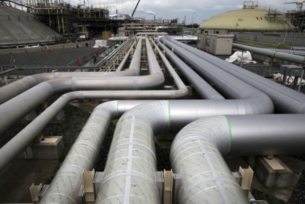Both Russian and US gas are in Germany's future energy mix
BERLIN, Nov 2 (Reuters) - Germany will likely be a buyer of liquid natural gas from the United States in the medium term, the government official tasked with trans-Atlantic relations said on Friday, but not as a result of any threats from Washington.

Peter Beyer, Berlin's coordinator for relations with North America said Germany needs to diversify its energy mix as North Sea gas runs out and insisted that a Russian pipeline vehemently opposed by Washington was needed.
Berlin's ties with the United States have been under immense strain since President Donald Trump took office, and the planned Nord Stream 2 pipeline, which would bring Russian gas straight to Germany under the Baltic Sea, has been a particular concern.
"Germany's energy sources in the North Sea for example are running out and we have a responsibility to spread risks," he told Reuters on Friday, conceding that the pipeline would likely bring a sharpening of Washington's sanctions regime.
Washington has threatened to impose sanctions on companies that participate in the building of projects like Nord Stream 2, which U.S. officials say helps the Kremlin finance destabilising activities around the world, as well as cutting Ukraine out of lucrative transit fees as it battles Moscow-backed separatists.
"I personally expect that we will see a sharpening of the (sanctions) guidelines at the beginning of the year," he said. "Whether that means we actually get tougher sanctions I don't yet know."
The U.S., which has become a major exporter of gas thanks to shale drilling, is keen to open new markets by ensuring energy net importers like industrial powerhouse Germany construct terminals capable of receiving liquefied gas.
Beyer said that U.S. LNG was still too expensive to be competitive with other energy sources, but that this would likely change as the market expanded, though it was not yet clear whether Berlin would provide financial support for the building of such a port, as many urge.
He added that Washington had escalated its willingness to threaten sanctions in pursuit of its foreign policy goals in recent months, including its attempts to hinder European companies trading with Iran. (Reporting by Thomas Escritt; Editing by Elaine Hardcastle)

- RWE strengthens partnerships with ADNOC and Masdar to enhance energy security in Germany and Europe
- TotalEnergies and Mozambique announce the full restart of the $20-B Mozambique LNG project
- Five energy market trends to track in 2026, the year of the glut
- Venture Global wins LNG arbitration case brought by Spain's Repsol
- Trinity Gas Storage reaches FID on Phase II expansion



Comments